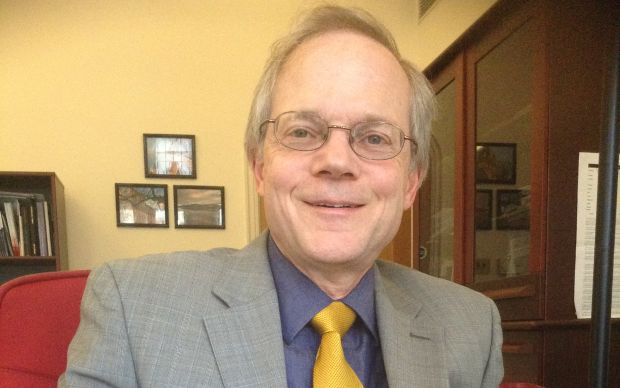
File photo of IISS Director of Non-Proliferation and Disarmament Program, Mark Fitzpatrick. (Asharq Al-Awsat)
London, Asharq Al-Awsat—A breakthrough agreement between Iran and the P5+1 group of world powers over Tehran’s nuclear project took the world by surprise on Sunday. While the deal was cautiously welcomed in the Middle East, Israel has denounced it as a “historic mistake.”
In an exclusive interview with Asharq Al-Awsat, Director of the International Institute for Strategic Studies (IISS) Non-Proliferation and Disarmament Program, Mark Fitzpatrick, gives his view of the deal.
Fitzpatrick is a founding member of the EU Non-Proliferation Consortium and a leading export on nuclear non-proliferation, particularly regarding Iran. He is the author of The Iranian Nuclear Crisis: Avoiding Worst-Case Outcomes and served as editor of the IISS Strategic Dossiers Iran’s Nuclear, Chemical and Biological Capabilities (2011), Iran’s Ballistic Missile Capabilities (2010), and Nuclear Programmes in the Middle East: In the Shadow of Iran (2008).
Asharq Al-Awsat: What’s your general assessment of the Geneva deal?
Mark Fitzpatrick: This is a good deal because Iran’s capabilities in every part of the nuclear program of concern are capped, with strong verification measures. Because of the verifiable capping, the deal is in the US, Israel and Gulf states’ interest. Stopping the 3.5-5% stockpile from growing is a key element of the deal—one of the ways Iran’s nuclear program is capped for six months. In fact the more I read about the Iran deal, the more it becomes clear that anybody knocking it didn’t really want any agreement whatsoever.
Q: In your view, which side conceded the most?
Iran clearly gave the most concessions, including by acceding to the two points that France insisted on during the previous round in Geneva: a halt in construction of the Arak reactor and removal of any official recognition of a right to enrichment.
Q: Why do you think Iran conceded so much now, particularly given their refusal to give up any ground in previous rounds of negotiations?
Iran made these concessions because of two reasons: Firstly, it wants to escape the pain of sanctions and become a normal country that is not despised by the advanced nations of the world. Secondly, Iran realizes that it already has accomplished most of what it needed in order to have a nuclear hedging strategy. It can still build a nuclear weapon in less than a year if it were to make this fateful decision. Having advanced so far in its nuclear capabilities, Iran can now afford to relax and accept some compromises.
Q: Does this deal truly block Iran’s path to nuclear weapons as President Obama claimed in his statement?
The deal does not block Iran’s path to nuclear weapons but it doubles the time it would take. Doubling the break-out time means that other countries would know in time to take action to stop it.
Q: What should we expect to happen over the course of the next six months?
In the next six months the parties will strive to achieve a longer-term deal. This will be more difficult, because it will require more concessions from both sides—concessions that would be strongly opposed by the hardliners in each capital. I am not optimistic that a longer-term deal can be achieved.
Q: So what is your final judgment on the Geneva nuclear deal?
The Geneva deal significantly sets back Iran’s ability to produce nukes without being detected and stopped. This is a good day for non-proliferation. I’ve been saying that quiet US-Iran bilateral talks were needed to get a deal, and I’m glad to know they were kept secret.

Trackbacks/Pingbacks